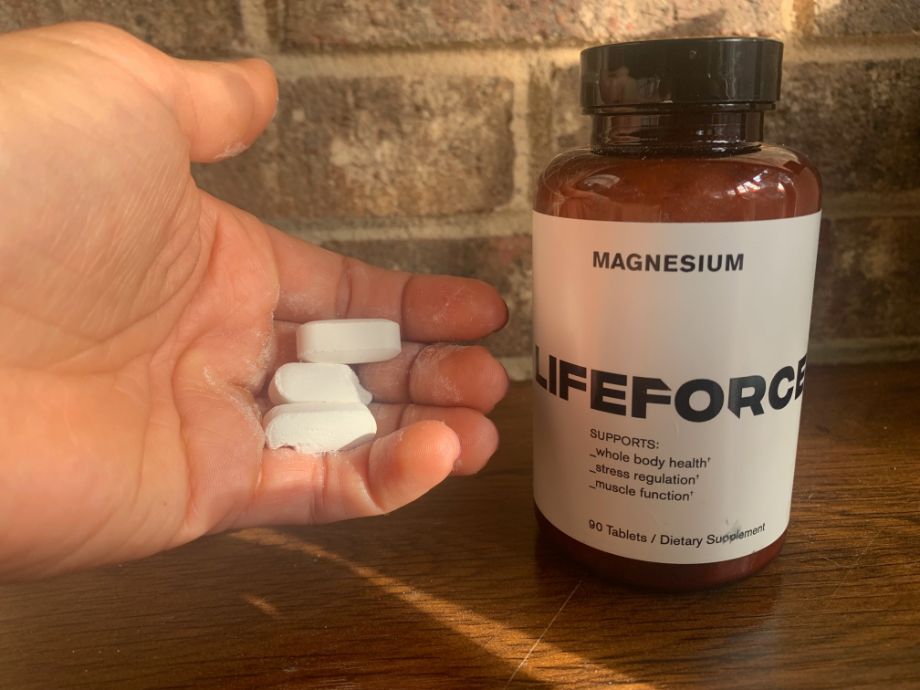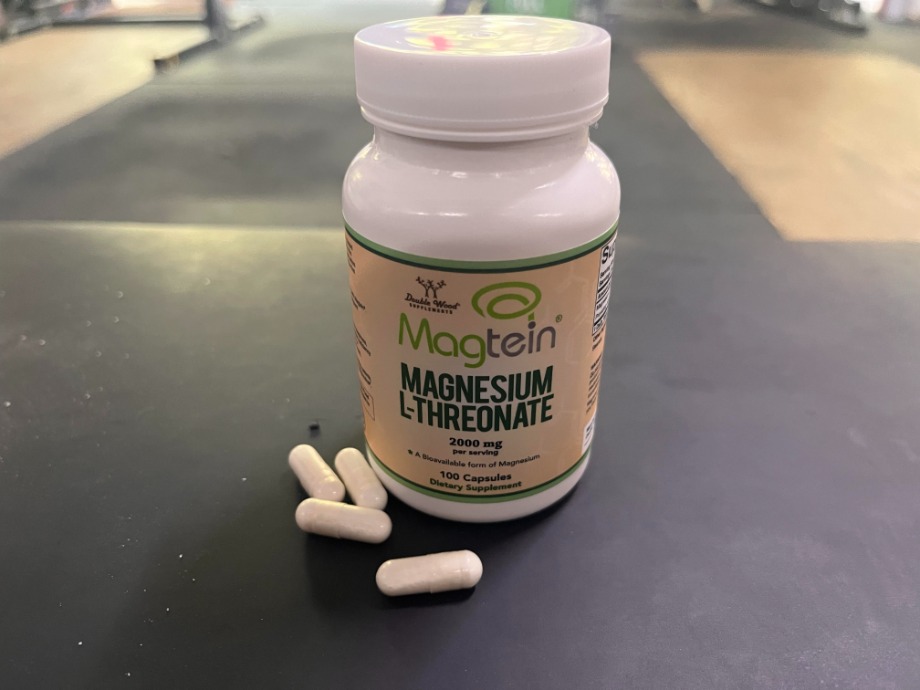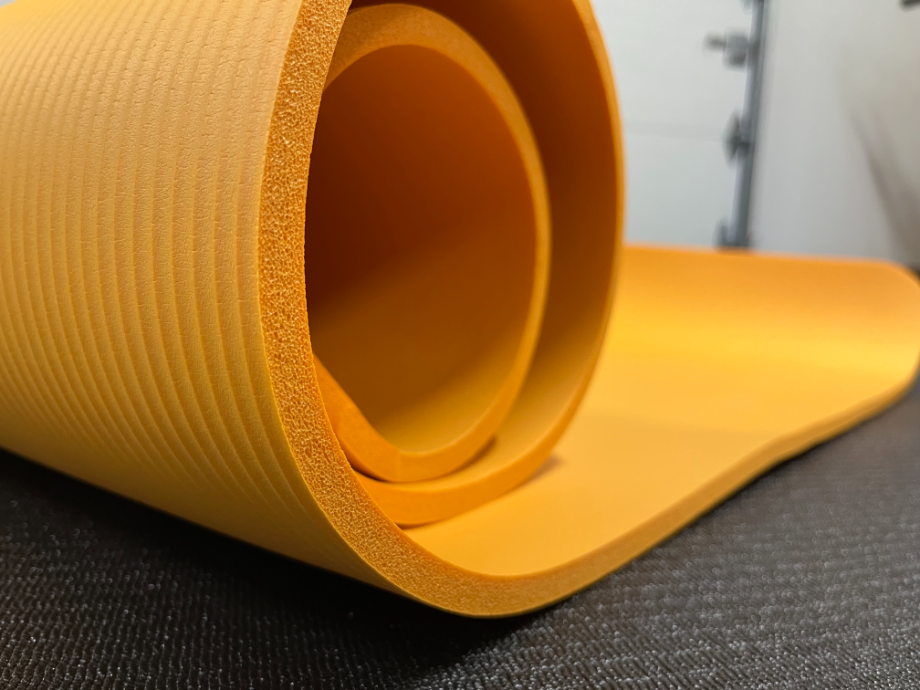Many times, vitamin and mineral supplements don’t provide significant health benefits unless you’re deficient in those nutrients. Magnesium supplements, however, seem to be an exception, with more and more research being done on their benefits for a variety of conditions.
If you’ve been on the lookout for the best magnesium supplement, I’m sure you’ve quickly realized just how many options are available. The best magnesium supplement for constipation isn’t always the best choice for relieving migraines or correcting a poor diet, so it’s important to learn about the different forms of magnesium and what they’re best used for.
As a registered dietitian, I’ll provide an overview of 10 different types of magnesium to help you choose the right dietary supplement for your health needs.
Medical disclaimer: This article is intended for educational and informational purposes only. It is not intended as a substitute for medical advice. For health advice, contact a licensed healthcare provider.
Quick Look At Magnesium
Magnesium is a mineral and electrolyte involved in an incredible number of biochemical functions. It’s a key player in the metabolism of carbohydrates and proteins, nerve function, muscle function, immunity, blood sugar management, and blood pressure regulation, to name a few.
Magnesium is an essential mineral. The human body can’t produce its own magnesium, so we need to obtain it from dietary sources. A well-balanced diet is generally able to provide all the magnesium we need.
However, research indicates that most people in the United States don’t eat enough foods high in magnesium. Additionally, people with malabsorptive conditions like Crohn’s or Celiac disease, older adults, those taking diuretics, or people with uncontrolled Type 2 diabetes or alcoholism are at higher risk for low magnesium levels.
This is where magnesium supplements can come in clutch. And their use isn’t just limited to addressing magnesium deficiencies—they’re also used to treat a variety of health issues, with different types of magnesium offering different types of benefits.

Here, I’ll give you the low-down on the 10 most commonly used types of magnesium:
- Magnesium citrate
- Magnesium glycinate
- Magnesium oxide
- Magnesium orotate
- Magnesium sulfate
- Magnesium L-threonate
- Magnesium chloride
- Magnesium taurate
- Magnesium lactate
- Magnesium malate
Magnesium Citrate
Magnesium citrate is a combination of magnesium and citric acid, a compound found naturally in citrus fruits. It dissolves easily in water and is available as a powder or liquid.
This type of magnesium is classified as a saline laxative, which attracts water into the small intestine. It’s commonly used as part of a bowel prep regimen to clear stools from the colon prior to a colonoscopy or colorectal surgery.
It’s also used to treat occasional constipation. Since it’s so much more aggressive than stool softeners or bulk-forming laxatives, however, it isn’t the first choice. It can also cause laxative dependence when used too often, which means you’ll find it harder to “go” once you stop using it.
Magnesium citrate is highly absorbable and has been studied for its potential benefits for muscle soreness1 and even resistance training performance when taken before a workout, at least in the short term. Research is still limited, however, and the optimal efficacious dose isn’t yet known.
RELATED: Best Recovery Protein Powder
Magnesium Glycinate
Magnesium glycinate is produced by combining magnesium ions with glycine, an amino acid found in protein-containing foods like beans, meat, and fish.
Because magnesium glycinate is chelated (bound to an amino acid), it’s highly bioavailable and easily absorbed through the small intestine. Unlike some other sources of magnesium, it doesn’t have laxative effects and isn’t used for constipation.
Instead, magnesium glycinate is a popular choice for mental health. There’s some limited research showing it may be effective for disorders like anxiety and insomnia thanks to the potentially calming effect2 glycine might have on the brain.

It’s also a popular choice for treating depression, but the evidence here is still inconclusive, according to a May 2018 review paper published in Nutrients3.
Anecdotally, magnesium glycinate is often used to prevent migraines. However, evidence supporting the use of this particular type of magnesium for migraines is still limited.
There’s good news for gym rats, though—a recent systematic review4 found that magnesium glycinate reduced muscle soreness and improved participants’ subjective feelings of recovery after a resistance training session. The authors suggested that the greatest benefits may come when taking magnesium 2 hours prior to hitting the gym.
Magnesium Oxide
Magnesium oxide is an oxide salt of magnesium, which is basically a combination of magnesium and oxygen. You’ll find it in capsule or tablet forms.
Two of the most common uses for magnesium oxide are as a supplement for people who don’t consume enough magnesium and as a treatment for constipation. It isn’t as bioavailable as some other types of magnesium, but it’s very affordable and considered safe for long-term use.
Magnesium oxide is a great choice for chronic constipation since it doesn’t act as a stimulant laxative, meaning the body won’t develop a tolerance to it when used for long periods of time. And because it stays in the gut for a while before it gets absorbed, the risk of having excessive magnesium levels in the blood is lower than quicker-absorbing forms of magnesium.
It’s also commonly used as an antacid to relieve gastrointestinal complaints like heartburn, acid reflux, and indigestion. Some people take it to help manage Irritable Bowel Syndrome with Constipation (IBS-C), but we don’t have enough evidence to support its effectiveness for this condition just yet.
Interestingly, the American Migraine Foundation lists magnesium oxide as the most effective type of magnesium for preventing migraines, especially migraine with aura or migraines associated with premenstrual syndrome. It may also help older adults with insomnia5, but more research is needed to determine just how effective it truly is.
Magnesium Orotate
This form of magnesium is combined with orotic acid, a compound found in the human body that helps with the production of DNA. Orotic acid is an antioxidant and mineral carrier that boosts the absorption of whichever mineral it’s paired with—in this case, magnesium.
Magnesium orotate is often used to prevent and treat magnesium deficiency and to calm acid reflux. It’s typically well-tolerated, although side effects like diarrhea and upset stomach are possible. Fortunately, taking magnesium supplements with a meal can be helpful.
Magnesium orotate has been studied in depth for its cardiovascular benefits. Research is still ongoing, but orotic acid may support the heart and blood vessels through its antioxidant effects and its role in energy production. And as we discussed earlier, magnesium plays a key role in blood pressure regulation.
RELATED: Cardiovascular Fitness
Interestingly, magnesium orotate has been shown to increase survival and reduce symptom severity in patients with severe congestive heart failure6.
When given to cardiac patients prior to surgery7 in an effort to improve their recovery, it helped prevent damage to the heart muscle, fought oxidative stress, and reduced the amount of time spent in the hospital. Because patients were also given coenzyme Q10, lipoic acid, selenium, and omega-3 fatty acids, however, it isn’t clear how much of these benefits were directly related to the magnesium orotate.
Magnesium Sulfate
Magnesium sulfate is made by reacting magnesium with sulfuric acid, an acid found widely in nature which consists of sulfur, oxygen, and hydrogen. While sulfuric acid itself is highly corrosive, sulfates (the salts that form when sulfuric acid is combined with minerals like magnesium) in these supplements are safe to consume.
This type of magnesium is best known under another name: Epsom salt. Epsom salt is widely available as a bath soak for sore muscles and can help with muscle aches and sprains. It can also be taken by mouth as a gentle remedy for constipation since it draws water into the intestines. Just be sure to follow the package directions.
While oral magnesium sulfate supplements can be used to correct low dietary consumption of magnesium, they’re not as common in the United States.
In addition to its benefits for sore muscles and bowel regularity, magnesium sulfate is an anticonvulsant. As such, it’s an effective way to reduce the risk of eclampsia-related seizures8 in pregnancy.
It has also been shown to help control heart rate in people with rapid atrial fibrillation (Afib) and prevent Afib from developing after coronary artery bypass surgery9 when administered through an IV.
Magnesium L-Threonate
Magnesium L-threonate may be uniquely suited to helping you get a better night’s sleep. To make magnesium L-threonate supplements, magnesium is combined with l-threonic acid in a multi-step manufacturing process. Capsules are the most common form.

L-threonate is produced naturally by the body and is found in human cerebrospinal fluid. This compound is believed to boost the bioavailability of magnesium, potentially helping it cross the blood-brain barrier into the brain.
In animal studies, magnesium L-threonate has been shown to improve cognitive function and memory and reduce stress and anxiety. It’s also been shown to improve symptoms of Alzheimer’s10 and Parkinson’s diseases in mice. While these results are promising, they still need to be confirmed with human studies.
That said, we do have research to support the benefits of magnesium L-threonate for improving sleep quality in middle-aged adults. In an August 2024 randomized controlled trial11, adults with self-reported sleep problems were given 1 gram of magnesium L-threonate or placebo every day for 3 weeks. Those given magnesium saw improved REM sleep and other sleep quality indicators, as well as better mood, mental alertness, and productivity during the day.
Like many other magnesium supplements, magnesium L-threonate can also be taken to prevent low magnesium levels that can result from a poor diet, medications, or health conditions causing poor nutrient absorption.
Magnesium Chloride
Magnesium chloride is a magnesium salt composed of magnesium and chlorine atoms. Chloride is formed when chlorine reacts with magnesium.
This type of magnesium supplement is typically available in capsules and is commonly used to correct low magnesium levels and treat mild constipation. It’s easy for the body to absorb and is well-tolerated by most people. As an electrolyte replenisher, it’s also used in hemodialysis and peritoneal dialysis fluids for people with end-stage renal disease.
RELATED: Best Electrolyte Drinks
Magnesium chloride may have additional benefits for mental health. When taking magnesium chloride for 6 weeks, participants in a 2017 randomized controlled trial12 with mild-to-moderate depression saw reductions in the severity of their depression and anxiety.
Daily magnesium chloride supplementation has also been shown to relieve pain and stress13 in people with fibromyalgia, an often debilitating condition that causes chronic pain and fatigue.
People with Type 2 diabetes may benefit from magnesium chloride as well, especially those with low magnesium levels in their blood. Magnesium chloride supplementation in these adults helped improve blood sugar levels, insulin resistance, triglyceride levels, and HDL (“good”) cholesterol levels compared to placebo.
These benefits need further study, but could be due to the ability of magnesium chloride to slow down how quickly carbohydrates leave the stomach and enter the bloodstream.
Magnesium Taurate
Magnesium taurate is synthesized in a lab by combining magnesium with taurine, an amino acid produced by the body and obtained from foods. Unlike many other amino acids, taurine isn’t used to build muscle. Instead, it has a variety of important functions like:
- Stabilizing cell membranes
- Acting as an antioxidant
- Inducing a sense of calm by depressing the central nervous system
- Lowering high blood pressure and cholesterol levels
- Assisting with muscle contraction during exercise
Magnesium taurate isn’t typically used to treat constipation, acid reflux, or low magnesium levels; the primary reason people take this supplement is to strengthen the cardiovascular system.
Research in rats has linked magnesium taurate with several benefits for heart health, including reductions in blood pressure and increased amounts of antioxidants within the heart muscle.
These results haven’t been replicated in human studies yet, but taurine is known for its ability to protect the heart and blood vessels from oxidative damage and may help stabilize clot-forming platelets14 in the blood.
Magnesium taurate appears to be one of the most bioavailable forms of magnesium, due in part to its classification as a chelated mineral bound to an amino acid.
Magnesium Lactate
Magnesium lactate is the magnesium salt formed when magnesium ions are combined with lactic acid in a lab. Gym-goers will recognize lactic acid as the substance that builds up within the muscle during short bursts of high-intensity anaerobic exercise, such as sprinting and heavy weight-lifting.
This type of magnesium is absorbed very well in the small intestine and is more bioavailable than magnesium oxide or magnesium sulfate.
Most commonly, it’s used to correct low levels of magnesium and relieve symptoms of heartburn and indigestion. It’s also approved by the FDA for use as an acidity regulator in food.
Magnesium lactate isn’t limited to these uses, though—it may also boost muscle recovery in athletes. According to a July 2024 systematic review15, magnesium lactate supplementation reduced multiple biomarkers of muscular damage, potentially shortening recovery time after a training session.
RELATED: Best Muscle Recovery Supplements
Limited research in rodents suggests that supplementation with small amounts of magnesium lactate increased the size of one lower leg muscle and improved the ability of the heart to contract. It will be interesting to see if these results translate to humans.
Magnesium Malate
Magnesium malate is a form of magnesium combined with malic acid, a compound naturally found in many fruits and vegetables. Malic acid assists the body with energy production, may reduce muscle pain, and can help prevent the formation of calcium-oxalate kidney stones.
Unlike magnesium chloride, a 2019 meta-analysis16 didn’t show any improvements in fibromyalgia symptoms when taking magnesium malate.
However, it could be a good choice for boosting magnesium intake thanks to its high absorption rate. It can also provide relief from uncomfortable indigestion and acid reflux symptoms.
People with kidney problems should consult their physician before supplementing with magnesium malate, as these individuals are at higher risk for excessively high levels of magnesium in the blood.
Different Types of Magnesium: Final Thoughts
The evidence-backed benefits of magnesium supplements are impressive, but it’s important to remember that these health benefits can vary depending on the supplement.
There are many different types of magnesium supplements, all of which differ in their bioavailability, cost, and effectiveness for treating certain health conditions. Some types may require caution in people with certain medical conditions, such as kidney disease.
When choosing a magnesium supplement, keep the following in mind:
- Magnesium citrate: Strong laxative used for bowel prep, may help reduce muscle soreness.
- Magnesium glycinate: Highly bioavailable and may help with mental health concerns like anxiety, insomnia, and depression.
- Magnesium oxide: Affordable and helpful for chronic constipation, migraines, acid reflux, and boosting magnesium intake. May help with insomnia in older adults.
- Magnesium orotate: Helpful for boosting magnesium intake, treating acid reflux, and supporting cardiovascular function.
- Magnesium sulfate: Also known as Epsom salt, helpful as a soak for sore muscles and preventing eclampsia-related seizures.
- Magnesium L-threonate: Highly bioavailable, helpful for improving sleep quality, and may be effective for improving cognitive function and memory.
- Magnesium chloride: Helpful for boosting magnesium intake and treating mild constipation, may support mental health, improve insulin sensitivity, and relieve pain and stress in fibromyalgia.
- Magnesium taurate: Highly bioavailable, may help strengthen the cardiovascular system.
- Magnesium lactate: Helpful for boosting magnesium intake and treating acid reflux. May support muscle recovery after exercise.
- Magnesium malate: Highly bioavailable; helpful for magnesium deficiency, acid reflux, and indigestion.
Different Types of Magnesium: FAQs
Which is the best form of magnesium to take?
Different forms of magnesium offer different benefits, so it’s important to discuss your health needs with your physician or registered dietitian nutritionist before choosing a magnesium supplement.
Do different types of magnesium do different things?
Sort of. There’s some overlap—for example, multiple types of magnesium are good for treating constipation, correcting low magnesium levels in the body, and relieving symptoms of acid reflux. However, not all types of magnesium are helpful for relieving stress, anxiety, migraines, insomnia, or fibromyalgia-related pain.
Is it better to take magnesium citrate or magnesium glycinate?
This depends on the type of benefits you’re looking for. Magnesium citrate is a strong laxative that may help improve muscle soreness, while magnesium glycinate has potential benefits for anxiety, sleep, and depression and may also help with muscle soreness.
Which magnesium is best for sleep and anxiety?
Magnesium glycinate and magnesium oxide have both been studied for sleep and anxiety. Research is still limited, however, so be sure to discuss these supplements with a healthcare professional before using them.
These statements have not been evaluated by the Food and Drug Administration. This product is not intended to diagnose, treat, cure, or prevent any diseases.
References
- Tarsitano MG, Quinzi F, Folino K, et al. Effects of magnesium supplementation on muscle soreness in different type of physical activities: a systematic review. J Transl Med. 2024;22(1):629. Published 2024 Jul 5. doi:10.1186/s12967-024-05434-x
- Bannai M, Kawai N. New therapeutic strategy for amino acid medicine: glycine improves the quality of sleep. J Pharmacol Sci. 2012;118(2):145-148. doi:10.1254/jphs.11r04fm
- Wang J, Um P, Dickerman BA, Liu J. Zinc, Magnesium, Selenium and Depression: A Review of the Evidence, Potential Mechanisms and Implications. Nutrients. 2018;10(5):584. Published 2018 May 9. doi:10.3390/nu10050584
- Tarsitano MG, Quinzi F, Folino K, et al. Effects of magnesium supplementation on muscle soreness in different type of physical activities: a systematic review. J Transl Med. 2024;22(1):629. Published 2024 Jul 5. doi:10.1186/s12967-024-05434-x
- Mah J, Pitre T. Oral magnesium supplementation for insomnia in older adults: a Systematic Review & Meta-Analysis. BMC Complement Med Ther. 2021;21(1):125. Published 2021 Apr 17. doi:10.1186/s12906-021-03297-z
- Stepura OB, Martynow AI. Magnesium orotate in severe congestive heart failure (MACH) [published correction appears in Int J Cardiol. 2009 May 1;134(1):144]. Int J Cardiol. 2009;134(1):145-147. doi:10.1016/j.ijcard.2009.01.047
- Leong JY, van der Merwe J, Pepe S, et al. Perioperative metabolic therapy improves redox status and outcomes in cardiac surgery patients: a randomised trial. Heart Lung Circ. 2010;19(10):584-591. doi:10.1016/j.hlc.2010.06.659
- Cagino K, Prabhu M, Sibai B. Is magnesium sulfate therapy warranted in all cases of late postpartum severe hypertension? A suggested approach to a clinical conundrum. Am J Obstet Gynecol. 2023;229(6):641-646. doi:10.1016/j.ajog.2023.07.021
- Hoffer M, Tran QK, Hodgson R, Atwater M, Pourmand A. Utility of magnesium sulfate in the treatment of rapid atrial fibrillation in the emergency department: a systematic review and meta-analysis. Eur J Emerg Med. 2022;29(4):253-261. doi:10.1097/MEJ.0000000000000941
- Liao W, Wei J, Liu C, et al. Magnesium-L-threonate treats Alzheimer’s disease by modulating the microbiota-gut-brain axis. Neural Regen Res. 2024;19(10):2281-2289. doi:10.4103/1673-5374.391310
- Hausenblas HA, Lynch T, Hooper S, Shrestha A, Rosendale D, Gu J. Magnesium-L-threonate improves sleep quality and daytime functioning in adults with self-reported sleep problems: A randomized controlled trial. Sleep Med X. 2024;8:100121. Published 2024 Aug 17. doi:10.1016/j.sleepx.2024.100121
- Tarleton EK, Littenberg B, MacLean CD, Kennedy AG, Daley C. Role of magnesium supplementation in the treatment of depression: A randomized clinical trial. PLoS One. 2017;12(6):e0180067. Published 2017 Jun 27. doi:10.1371/journal.pone.0180067
- Macian N, Dualé C, Voute M, et al. Short-Term Magnesium Therapy Alleviates Moderate Stress in Patients with Fibromyalgia: A Randomized Double-Blind Clinical Trial. Nutrients. 2022;14(10):2088. Published 2022 May 17. doi:10.3390/nu14102088
- McCarty MF. Complementary vascular-protective actions of magnesium and taurine: a rationale for magnesium taurate. Med Hypotheses. 1996;46(2):89-100. doi:10.1016/s0306-9877(96)90007-9
- Tarsitano MG, Quinzi F, Folino K, et al. Effects of magnesium supplementation on muscle soreness in different type of physical activities: a systematic review. J Transl Med. 2024;22(1):629. Published 2024 Jul 5. doi:10.1186/s12967-024-05434-x
- Ferreira I, Ortigoza Á, Moore P. Magnesium and malic acid supplement for fibromyalgia. Suplemento de magnesio y ácido málico para fibromialgia. Medwave. 2019;19(4):e7633. Published 2019 May 28. doi:10.5867/medwave.2019.04.7632







